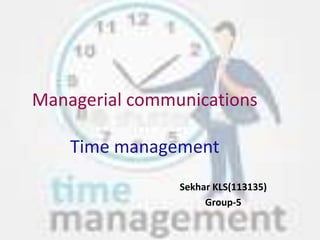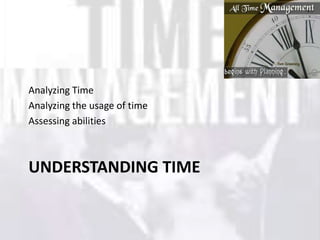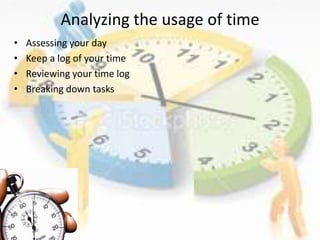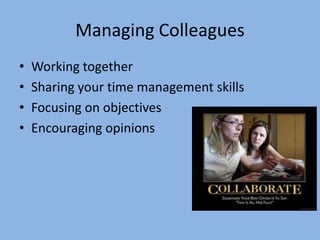Time management
- 1. Managerial communications Time management Sekhar KLS(113135) Group-5
- 2. UNDERSTANDING TIME Analyzing Time Analyzing the usage of time Assessing abilities
- 3. Analyzing Time âĒ change in attitude âĒ Using time wisely âĒ Managing queries âĒ Set a side some time to review
- 4. Analyzing the usage of time âĒ Assessing your day âĒ Keep a log of your time âĒ Reviewing your time log âĒ Breaking down tasks
- 5. Estimating abilities âĒ To Assess your ability there is a questionnaire of 30 questions âĒ In which you had to mark any of the options given 1 , 2, 3, 4 âĒ 1 for never; 2 for occasionally ; 3 for frequently; 4 for always; respective scores from each option marked âĒ we can analyze how efficiently we are utilizing the time from total scores
- 6. PLANNING FOR SUCCESS Analyzing your goals Working out Priorities Assessing work Patterns using time planners Thinking positively
- 7. Analyzing your goals âĒ Setting goals âĒ Long tem and short term âĒ Planning career goals & working on them
- 8. Working out Priorities âĒ Analyzing your work âĒ Prioritize work into 3 types A,B, &C âĒ delegate work that can be delegated âĒ Plan your day balancing demand. âĒ Being realistic
- 9. Assessing work Patterns âĒ Timing tasks âĒ Taking breaks from concentrated work âĒ Maximizing efficiency
- 10. using time planners âĒ Choosing a system âĒ Planning with a dairy âĒ Maintaining dairy âĒ Making a master list
- 11. Thinking positively âĒ Enjoying life âĒ Dealing with problems âĒ Avoiding stress
- 12. Making Instant Changes âĒ Clearing your office âĒ Filling papers âĒ Avoiding interruptions âĒ Filtering information âĒ Working with others âĒ Making phone calls âĒ Taking phone calls âĒ Reading and writing âĒ Using technology âĒ Holding meetings âĒ Travelling for work âĒ Scheduling time off
- 13. Clearing your office âĒ Projecting an image âĒ Processing documents âĒ Organizing paperwork and also work place âĒ âEvery minute used for organizing is an hour earned â
- 14. Filling papers âĒ Organizing your filling âĒ Breaking subjects down âĒ Labeling clearly âĒ Filling regularly
- 15. Avoiding interruptions âĒ Listings interruptions âĒ Discouraging interruptions âĒ Make your work space such that leaving less scope to disturb you
- 16. Filtering information âĒ Gaining information âĒ processing information âĒ Circulating material âĒ Dealing with reference âĒ Delegating your work âĒ keep it up to date
- 17. Working with others âĒ Assessing work rules âĒ Reviewing your assumptions âĒ Analyzing motivation âĒ Handling meetings
- 18. Making phone calls âĒ Choosing time to call âĒ Keeping on track âĒ Using a voice mail system âĒ Choosing a suitable phone for needs
- 19. Taking phone calls âĒ Making time for calls âĒ Dealing with cold callers âĒ Signaling the end of a phone call
- 20. Reading and writing. âĒ Learn to skim-read âĒ Over view of the content Make Use technology âĒ Filing on computer âĒ Using E-mail
- 21. Holding meetings âĒ Meeting one to one âĒ Timing small meetings âĒ Preparing an agenda âĒ Avoiding time wasting âĒ Keeping to schedule
- 22. Travelling for work âĒ Assessing need âĒ Packing efficiently âĒ Stay in touch âĒ Communicating while travelling âĒ update your notes
- 23. Scheduling time off âĒ Taking daily breaks âĒ Recharging batteries âĒ planning ahead âĒ Taking time for your self
- 24. MANAGING THE TIME OF OTHERS Communicating well Delegating effectively Managing Colleagues Managing your Manager
- 25. Communicating well âĒ Hearing is not the same as listening, learn to listen. âĒ Spreading information âĒ Take an interest in what others are trying to achieve.
- 26. Delegating effectively âĒ Learning to delegate âĒ Reinforcing a brief âĒ Strengthening responsibility
- 27. Managing Colleagues âĒ Working together âĒ Sharing your time management skills âĒ Focusing on objectives âĒ Encouraging opinions
- 28. Managing your Manager âĒ Building a relationship âĒ Communicating effectively âĒ Getting your own way âĒ Knowing when to offer advise
Editor's Notes
- #3: Every body has to manage their time to some extent whether it be at home or work .
- #5: Routine tasks Ongoing tasksPlanning and development
- #9: How much time you spend doing wrong task at wrong timeType A : important and urgentType B : either urgent or important but not bothType C: neither important nor urgent but routine
- #21: Catch hold of the key words to understand the sentences
- #22: --One to one meetings are focused on particular situation or event--Timing small meetings are mainly for recruiting o r staff assessment
- #23: Stay in touch with office communicating while travelling
- #24: Taking daily breaksRecharging batteries planning aheadTaking time for your self
- #27: Set precise n realistic deadlines
- #28: Prioritising tasks/work




























